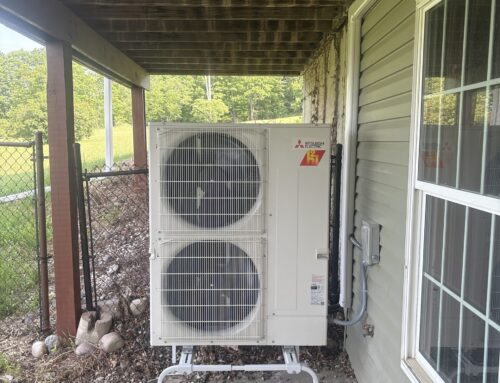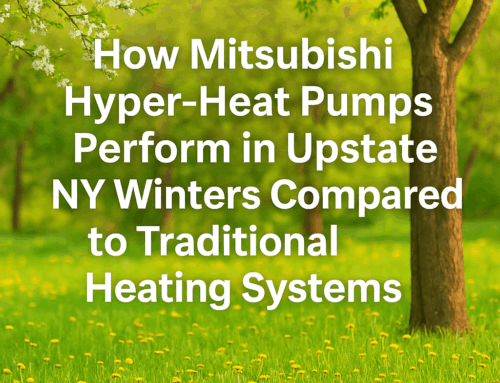
Wintertime brings many heating difficulties and if you have a heat pump in your home then you may be no stranger to these issues. So today we wanted to take a look at what to do when you find that your heat pump coils are frozen. We are sure that you know that frozen heat pump coils mean no heat in your home. Here is what to do when you find frozen heat pump coils!
What to Do When Heat Pump Coils Freeze
Some ice on the coils is normal, but if your heat pump’s coils freeze up, you need to take action fast.
An air-source heat pump provides very efficient heating for homes in almost all climate zones, although they offer the best performance when temperatures are in the above-freezing range. Even in milder climates, however, it’s possible for the heat pump’s coils to freeze up. When this happens, it puts your system at risk for significant damage and raises energy costs, too.
Why Do Heat Pump Coils Freeze?
During the regular heating operation of a heat pump, it’s normal for a little frost to form on the coils. That’s because, as the heat pump generates heat, the refrigerant takes on a gas form when it reaches the outdoor coil, then it condenses and releases some moisture. Heat pumps are equipped with a defrost component to address the problem and to melt the moisture as it freezes.
However, if the heat pump system malfunctions for some reason and ice build-up on the coil, it acts as a type of insulation, further compounding the problem and allowing the ice to build up even further. The defrost sensor should immediately sense the formation of ice and get to work defrosting the coils.
Some of the problems that can cause coils to freeze include:
• Low refrigerant levels
• A dirty air filter
• Faulty components inside the heat pump, such as a damaged sensor or metering device for the refrigerant
• Dirt buildup on the blower’s fan blades
• A failing blower motor
• Dirty coils
UPDATE
The above talks about issues on older heat pump systems. When using the new Cold Climate Heat Pumps that we offer from Mitsubishi these are not issues. Hyper Heating Mitsubishi systems come with heated pans that allow for proper drainage of water during a defrost cycle. Basically, when the coils start to have any kind of a build-up the system goes into a brief defrost cycle which melts the coil build-up, it then drips into a slightly heated pan and drains.
If you are interested in getting a free estimate and product functioning explanation of the new cold climate heat pumps now available get in touch with us, we’d love the opportunity to show you how these technologies have changed in recent years.
[button title=”Contact Us” link=”https://scoophvac.com/schedule-an-appointment/” target=”_blank” align=”” icon=”” icon_position=”” color=”#70e3f4″ font_color=”” size=”2″ full_width=”” class=”” download=”” rel=”” onclick=””]How to Detect Frozen Coils on a Heat Pump
It’s easy to detect frozen coils, but it requires a visual inspection of the coils from time to time. That’s why it’s important that heat pump owners regularly inspect the outdoor coils, especially in winter. The coils may be frozen and you can be completely unaware of the problem — until it’s too late, and your energy bills soar and the system breaks down.
If you see ice buildup on the coils, here’s what you should do:
• Turn off the heat pump, or switch the unit to the backup heating element
• Gently attempt to remove the ice from the coil, but don’t use a sharp tool that could potentially damage the coils
• Slowly pour warm water over the coils to melt the ice
If these steps don’t resolve the problem, call an expert HVAC contractor for help. Even if you’re able to melt the ice, it’s helpful to have a contractor evaluate the system and identify the source of the problem.
[button title=”Contact Us” link=”https://scoophvac.com/schedule-an-appointment/” target=”_blank” align=”” icon=”” icon_position=”” color=”#70e3f4″ font_color=”” size=”2″ full_width=”” class=”” download=”” rel=”” onclick=””]Heat Pump Maintenance
One of the best ways to avoid frozen coils on a heat pump involves maintenance. Because multiple issues can cause frozen coils, keeping the heat pump in good shape via annual service appointments ensures that the entire system is operational, and limits the effects of wear and tear. Maintenance also helps keep the system free of dirt buildup, one of the primary contributors that cause coils to freeze.
In addition to maintenance, follow these tips to keep the system running well:
• Don’t let ice and snow accumulate on the outdoor unit. After snowstorms and extreme weather, clear the unit of any accumulation.
• Make sure gutters above the outdoor unit are secure. Avoid letting the water drip out of the gutters and onto the unit to prevent water from leaking into the coils and freezing. An outdoor unit encased in snow and ice can also prohibit airflow, which leads to frozen coils.
• Level the unit. The outdoor unit must be 100 percent level; any tilting of the unit can restrict airflow and hinder the system from draining moisture properly.
Get expert advice about your air-source heat pump, and schedule regular service visits to keep it in tip-top shape.
This article was originally published on angieslist.com. If you have found that you have a frozen heat pump then you will want us to come to take a look at your system to make sure that you are not working against any other issues with your heat pump. Be sure to contact us today!
[button title=”Contact Us” link=”https://scoophvac.com/schedule-an-appointment/” target=”_blank” align=”” icon=”” icon_position=”” color=”#70e3f4″ font_color=”” size=”2″ full_width=”” class=”” download=”” rel=”” onclick=””]Newer Technology Heat Pumps Now Reducing This Has a Problem: Updated Information
Newer technology heat pumps are designed to minimize the risk of freezing, and they generally have better freeze protection features compared to older heat pumps. However, even with advanced technology, heat pumps can still freeze in certain conditions.
One of the primary reasons that heat pumps can freeze is due to a lack of airflow. If the outdoor unit becomes covered in snow, ice, or debris, it can restrict the flow of air and cause the heat pump to freeze. This can also happen if the air filters become clogged or if there are obstructions in the ductwork.
To prevent freezing, modern heat pumps have built-in defrost cycles that are designed to remove any ice buildup on the outdoor unit. During a defrost cycle, the heat pump will temporarily switch to cooling mode to melt any ice on the coils, and then switch back to heating mode once the ice has melted.
Newer heat pumps may also have additional freeze protection features, such as temperature sensors that can detect when the unit is at risk of freezing and automatically activate the defrost cycle.
Overall, while newer technology heat pumps are designed to be more efficient and reliable than older models, they can still freeze if airflow is restricted or other conditions are present. To ensure proper operation, it is important to have your heat pump inspected and maintained regularly by a professional HVAC technician.
Heat pumps can freeze up when there is a buildup of ice on the outdoor unit’s coils. This is often caused by a lack of airflow over the coils, which can be due to a dirty air filter, a blockage in the ductwork, or a malfunctioning fan. When there is insufficient airflow, the refrigerant in the heat pump’s coils can become too cold and cause condensation to freeze on the coils.
To prevent your heat pump from freezing up, it’s important to ensure that there is proper airflow over the outdoor unit’s coils. This means cleaning or replacing the air filter regularly, keeping the area around the outdoor unit clear of debris, and having the ductwork inspected for blockages. Additionally, some heat pumps have built-in defrost cycles that can help prevent ice buildup. However, if your heat pump is freezing up frequently, it’s important to have it inspected by a professional HVAC technician to identify and address any underlying issues.
If your heat pump freezes up, it’s important to turn off the unit and allow the ice to melt. Do not attempt to scrape or chip away the ice, as this can damage the coils. Once the ice has melted, inspect the air filter and ductwork for any obstructions, and ensure that there is proper airflow over the coils. If the problem persists or if you notice any other issues with your heat pump, contact a professional HVAC technician to inspect and repair the unit.
How to Remove Ice from Mini Split: A Comprehensive Guide by Superior CO-OP HVAC
Mini split systems are a popular heating and cooling solution, known for their efficiency and versatility. However, like any HVAC system, they can encounter issues, such as ice buildup on the outdoor unit during cold weather. Ice accumulation can hinder performance and even cause damage if not addressed promptly.
At Superior CO-OP HVAC, we understand the importance of maintaining your mini split system in optimal condition. In this blog post, we’ll guide you through the process of safely removing ice from your mini split and provide tips to prevent future ice buildup.
Why Does Ice Form on Mini Split Systems?
Ice can form on the outdoor unit of a mini split system due to various reasons, including:
- Low refrigerant levels
- Dirty or blocked coils
- Malfunctioning defrost controls
- Extremely cold weather conditions
How to Remove Ice from Your Mini Split
Step 1: Turn Off the System
Always start by turning off the mini split system to ensure safety during the ice removal process.
Step 2: Inspect the Unit
Check for visible signs of damage or other underlying issues that may have caused the ice buildup.
Step 3: Remove Ice Gently
- Use a soft brush or cloth to gently remove loose ice and snow.
- Avoid using sharp objects or excessive force, as this can damage the unit.
Step 4: Allow the Unit to Defrost
- If ice remains, allow the unit to defrost naturally by leaving it off for a few hours.
- You can also use the system’s defrost mode if available.
Step 5: Check for Underlying Issues
- Inspect filters, coils, and refrigerant levels to identify any potential problems that may have contributed to the ice buildup.
Step 6: Seek Professional Assistance if Needed
- If you’re unable to remove the ice or suspect underlying issues, contact a professional HVAC technician, such as Superior CO-OP HVAC, for assistance.
Tips to Prevent Ice Buildup
- Regularly clean and maintain the outdoor unit.
- Ensure proper refrigerant levels.
- Schedule routine professional maintenance to detect and address potential issues early.
Conclusion: Trust Superior CO-OP HVAC for Your Mini Split Needs
Ice buildup on a mini split system can be a concerning issue, but with proper care and attention, it can be resolved. If you’re unsure about handling the situation yourself, don’t hesitate to reach out to Superior CO-OP HVAC. Our experienced technicians are here to assist you with all your mini split needs, ensuring optimal performance and longevity.
Another Hot Topic Question
Can I Pour Hot Water on a Frozen Air Conditioner?
It’s a common question and one that might seem like a quick solution to a frozen air conditioner: Can you pour hot water on the unit to melt the ice? While it may be tempting, this method is not recommended for several reasons:
1. Potential Damage to Components
- Pouring hot water on a frozen air conditioner can cause sudden temperature changes, leading to cracks or other damage to the coils and other sensitive components.
2. Risk of Electrical Issues
- Water and electricity are a dangerous combination. Pouring water on the unit may lead to electrical shorts or other hazards.
3. Ineffective Solution
- Melting the ice with hot water may only address the surface problem without resolving the underlying issue that caused the freezing in the first place.
4. Potential Warranty Voidance
- Using hot water to defrost the unit might void the manufacturer’s warranty, leaving you without coverage for any subsequent issues.
What to Do Instead?
- Allow Natural Defrosting: If ice has built up, turn off the system and allow it to defrost naturally.
- Use the System’s Defrost Mode: Many modern mini split systems have a defrost mode designed to safely remove ice.
- Contact a Professional: If you’re unsure about handling the situation yourself, reach out to a professional HVAC technician, such as Superior CO-OP HVAC, who has the expertise to safely and effectively address the issue.
Conclusion: Safety First
While pouring hot water on a frozen air conditioner might seem like a quick fix, it can lead to more problems than it solves. Always prioritize safety and the integrity of your system by following proper procedures or seeking professional assistance.

What Causes Heat Pump Coils to Freeze?
Understanding why heat pump coils freeze is crucial for effective maintenance. Several factors contribute to this issue, such as low airflow and extreme weather conditions.
Understanding why heat pump coils freeze is crucial for effective maintenance and long-term system health. Several factors contribute to this issue, and being aware of them can help you take preventive measures. Here are some of the most common causes:
Inadequate Airflow
One of the primary reasons heat pump coils freeze is inadequate airflow. When the air can’t circulate properly, it can cause the coils to get too cold and eventually freeze. This can happen due to dirty air filters, blocked vents, or malfunctioning fans.
Low Refrigerant Levels
Low refrigerant levels can also lead to frozen coils. When there’s not enough refrigerant, the coils can get too cold during the heat exchange process. It’s essential to check refrigerant levels regularly and refill them as needed.
Extreme Weather Conditions
Heat pumps are designed to work in a range of temperatures, but extreme cold can still cause the coils to freeze. When the temperature drops significantly, the system has to work harder to extract heat from the outside air, increasing the risk of freezing.
Faulty Thermostat
A malfunctioning thermostat can send incorrect signals to your heat pump, causing it to run longer than necessary or at inappropriate times, which can lead to frozen coils.
Moisture and Humidity
High levels of moisture and humidity can also contribute to frozen coils. When moisture accumulates on the coils, it can freeze, affecting the heat pump’s efficiency and performance.
Lack of Maintenance
Regular maintenance is crucial for preventing frozen coils. Neglecting routine checks and failing to clean or replace parts can lead to various issues, including freezing.
By understanding these common causes, you can take proactive steps to prevent your heat pump coils from freezing and ensure a more efficient and reliable heating system.
Superior CO-OP HVAC’s Unique Approach to Preventing Frozen Coils
At Superior CO-OP HVAC, we go the extra mile to minimize issues like frozen coils. Our outdoor heat pump units are mounted on elevated legs with a flat and solid foundation, keeping them out of the snow and reducing the risk of freezing.
How to Detect and Address Frozen Coils
Regular inspections can help you detect frozen coils early. If you notice any signs, it’s essential to take immediate action to prevent long-term damage.
Maintenance Tips for Avoiding Frozen Coils
Routine maintenance can go a long way in preventing your heat pump coils from freezing. Here are some tips to keep your system running smoothly.
One Comment
Comments are closed.
Save More, Stay Informed!
Sign up for our newsletter and be the first to receive:
✅ Exclusive Sales & Rebates on Mitsubishi Heat Pumps.
✅ Industry News and Expert HVAC Tips.
✅ Updates That Help You Save Energy and Money.






[…] Frost or ice buildup on a heat pump coils is also a common factor leading to the activation of the defrost mode. When the outdoor temperatures drop, the moisture in the air can turn into frost or ice on the outdoor coil of the heat pump. […]